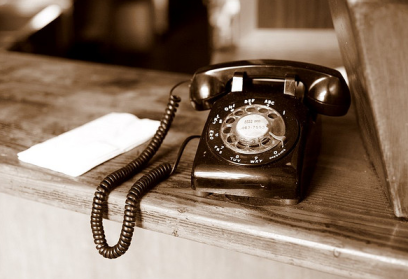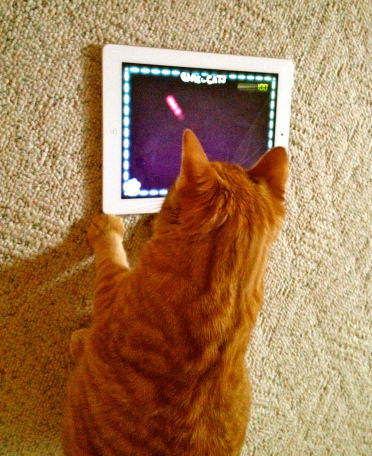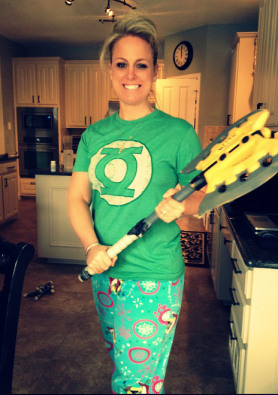Should Authors Have to “Market Themselves”?
“Crap. Revisions tore my hose. But I need to sell more books and get out and ‘market myself’…”
Image via Darwin Bell, Flickr Creative Commons.
All right, don’t stone me, but I feel some of the marketing “buzz words” range from terrifying to annoying to outright offensive. For instance, every time I read “target your demographic” or “target your readers” I wonder if this comes with a Predator Drone or at least a laser sight.
I don’t know about you guys, but I get creeped out being “targeted.” It makes it seem we (seller and consumer) are opponents—one the cunning victor and the other the hapless dupe who landed in the marketing crosshairs.
But the one that’s gotten my hackles up over the past week or so is when writers are beating themselves up. They write things in my comments like, “I know need to try harder to market myself” or “It’s no longer about marketing my books, I have to market ME.”
NO.
If I’ve in any way contributed to this feeling, my deepest apologies. I hope this post will clear things up.
The Difference Between Market Norms and Social Norms
Two norms guide all commerce. Market norms are cold, driven by data. We pay the price on the tag. There’s no emotion, and no relationship. All purchases and exchange of goods and services is simple. We don’t go to buy a computer then are hurt because we thought Best Buy was our BFF and could have made us a sweeter deal.
Social norms guide relationships. If I open the door for you, I don’t hold out my hand expecting a tip. When I make dinner for Hubby, I don’t bring him a check with 20% gratuity factored in because I have to clean the kitchen, too. If Hubby paid me after fooling around, he might suddenly go mysteriously missing.
Transition
In the 1990s, as the TV-Industrial complex began to crumble, we saw more and more businesses blending market and social norms.
Like a good neighbor, State Farm is there.
For corporations, using social norms can be beneficial. If we (consumers) like a company, we are willing to pay higher prices and can have greater loyalty. BUT, this company has a much steeper obligation. Don’t call us family then exploit us. Not only will we complain, we will raze your brand to the ground on-line. Companies can’t have the benefits that go with harnessing social norms, then forget the greater responsibility.
Evolution of Commerce
In the olden days, we didn’t have a lot of choices. When I was a kid, if you wanted to buy a new TV, there were about three brands to choose from. There were also three kinds of spaghetti sauce. Most household cleansers were manufactured by the same company. Ma Bell issued a phone when you activated a line in your home. If my parents wanted a different phone or a newer phone or a phone repaired? They called the phone company.

Image courtesy of Clemson via Flickr Creative Commons.
And had THREE colors to choose from  .
.
Yet, as markets opened up bringing increased competition, this presented a problem to The Big Guys who’d enjoyed gouging consumers who had no other place to go. Cheaper and even better options came along and the pseudo-monopolies began to crumble.
For instance, my husband has this COOL remote control car that can do speeds in excess of 55 mph and is extraordinarily maneuverable. When I was growing up, if you wanted a remote control car, you went to Radio Shack and took out a second mortgage on your house to buy one…and generally it worked once then died.
Remote control cars were The Great Class Divider—those who could afford one and then the rest of us.

Image courtesy of Gazanfarulla Khan via Flickr Creative Commons.
Now? In 2014? I can’t believe Radio Shack is still around. Sometimes I think it’s only because we still have a population over age 70 who still shops there. My grandfather, who is almost 90, still goes there to buy batteries, proving old habits die hard.
Yet, as the years passed, emerging markets offered newer, better and cheaper options. We could have all colors of phones. CORDLESS phones. Eventually phones with an answering machine built in and then Caller ID. More and more features and bells and whistles for less and less money.
When the Internet arrived, this only exacerbated the problem. And, as computers became more affordable, Internet service did too. E-Commerce arrived. Consumers no longer wanted to browse the window of an electronics store when they could purchase on-line cheaper and get free shipping.
Thus, with the explosion of options, market norms became highly problematic. To rely completely on market norms is a race to the bottom of who can give away the most stuff and the best stuff for free. How can companies mitigate this?
Let Me Introduce “Social Norms”
When we had only a handful of choices for coffee, we bought the one mom did. We chose between caffeinated, decaf, and instant. Fast-forward 20 years.
In an endless sea of coffee choices, manufacturers didn’t want to compete on price if they didn’t have to. Thus we now pay more than double if a coffee is “Rainforest Friendly” or “Organic.” Our purchases have come to reflect our values. Case in point, the new Follow the Frog campaign:
Is it non-GMO? Gluten-free? Environmentally friendly? Recycled? Does the manufacturer donate a portion of profits to charities we support?
Even large companies are realizing Facebook can be an asset and that people don’t want endless spam and promotion. We want a company that includes us and represents our values. We are willing to pay more to those kinds of companies. We want to like who we buy from.
We gravitate to companies with a real person behind the tweets and posts. Smart companies are recognizing they need to keep a finger on the pulse of their social platforms.
When I was ready to throw the first Mac I bought through the closest Apple Store window, I tweeted about my frustration. Guess who replied? Guess who worked tirelessly to make sure I was happy?
Guess who now uses Apple almost exclusively and has become a VERY good customer?

Yes, Hubby even downloaded a game for the CAT.
I was willing to pay more for a company that not only solved my problem, but actually seemed to care about it. When the HP I owned had issues (and I’d had several HPs over the course of a decade), HP ran me through and endless maze of chasing my own @$$ with confusing and impersonal on-line forms that went unanswered. They used the information to spam me instead of solving my problem.
In the end? I knew I’d pay more with Apple (and wouldn’t have any new clothes for at least five years), but I chose the company that made me feel they were on my side, that I was more than a number.
Back to the Eternal Question—Do Authors Have to Market Themselves?
We have to remember the distinction between a business and a human being. When humans start “marketing themselves” it drifts into Creepy Land. Bluntly, it makes me feel like I need fishnets, heels and a red light that hides my smile lines. Or maybe I need to take up juggling fire while wearing a costume and swallowing swords.

We strongly suspected Earl had a book for sale…
Image courtesy of Rafael-Castillio via Flickr Creative Commons.
Granted, all of us on some level “market ourselves.” When we apply for a corporate job, we know that we have to wear the right suit, the right smile and have the right answers in an interview if we want to land the job or promotion.
But what if we had a plan for “marketing ourselves” to make friends? A bullet-point reference to make others like us. Worse still, how ookie does it get when we actively put together a plan for people to like us so they will buy something from us?
Hey, Baby, you wanna date book?
Writers are not Geiko. We are not AFLAC or P&G or Apple. We are people. A company is a non-living thing striving to connect and be personable. Companies have always been in the goods and services business filling needs. Companies have always been driven by market norms and that’s never been a question of ethics.
When human interactions are driven by market norms? That’s called slavery and prostitution.
Writers are people. A person is a person. When I actively make a plan for people to like me so they will buy my book? I need a shower and counseling.
All Humans Have a Brand

My brand. Spongebob, Green Lantern and NERF—oh, and I write books, too.
Brand is merely what comes to mind when we think of a name. When I think of AT&T, I see red. It brings to mind hours of runaround with customer service and the half zillion times they have screwed up our bill (where we live we have no other option).
When it comes to people? They also have a brand. They could be our vegan friend who competes in triathlons or our zany friend who collects action figures and goes to ComicCon.
I don’t call Such-and-Such in an emergency because he’s a notorious flake. If I have a bad day, I call Thus-And-Such, because I know she is kind and will set down everything to let me cry.
I avoid Uncle Burney because all he talks about is baseball and is utterly oblivious to the fact that I am chewing my leg off to escape the conversation. On the other hand, I love Uncle Olaf, because he invites me to play video games with him. He laughs a lot and asks me about my writing…and cares about my answer.
We unfriend people on social media because they might be rude bullies who rant or complain non-stop. We gravitate to others because they make us laugh or are always positive. These people may or may not have a good or service for sale, but they DO have a brand.
When it comes to creating a “marketable author brand” I have zero interest in changing you beyond what would need to change in any normal social situation. Name-calling, negativity, bragging, self-centeredness, putting others down are not great habits for us to have in LIFE. Thus, we all need to ixnay them with social media or it WILL create a negative brand.
I understand some writers will have to press beyond being shy. But, being shy in our personal lives limits how much we can connect as well. I know. I used to have such bad social anxiety, the thought of talking to someone I didn’t know was enough to make me throw up in my shoes.
I attended five years of high school and five years of college and had no friends. If I didn’t want to be a loner all my life, I had to press past my profound fear of people to grow as a human being.
Self-Promotion
We don’t like people who promote themselves in person. Why would we like them on-line? Granted, writers do have to strike a balance. I find we generally end up gravitating to extremes. Either writers blast non-stop deals, specials, contests and tours to tout their latest book or, the fact they have a book for sale is a Top Secret.
We need to find that balance. I was in Rotary for almost seven years. I knew who was a dentist, a surgeon, an accountant, or a veterinarian. I did business with them first because I knew them as people. They didn’t need to show up to our weekly meetings with flyers and coupons. They didn’t need to sit at lunch an pitch me how they were the best surgeon for removing suspicious moles.
The Two Basic Differences in a Regular Person Brand and an Author Brand
All this said, I will admit our brand is slightly different and I am going to use the word marketable extremely carefully. WANA isn’t here to slap your on-line personality in a short dress and digital body glitter.
Don’t come back until you’ve sold some books.
Yes, regular people have a brand, but most regular people don’t want to use that brand to sell books. Aside from being a nice human being, the crucial differences in a regular person’s “brand” and our “author brand” are:
Community is Part of Our Job
If a regular person disappears off Facebook for six months, it doesn’t matter. We as writers should have a goal of creating an authentic community, of creating relationships with those in our circles. Then, we are tasked with maintaining that community and hopefully growing it. If we only appear out of the ether when we have a book for sale, we become about as appealing as that cousin who never calls unless he needs bail money.
Authentic relationships will help us personally and professionally. We need a system of support. We also can be that support for others. Service is good for the soul and sound relationships are a two-way street. Book sales may or may not directly evolve from this, but it’s a better use of time than spamming victims from a purchased e-mail list.
Clarity is KEY
If a regular person wants to tweet using @I_LuvPandas, @LovelyKisses99 or @CarolinaChik, that’s fine. No one needs to know their name. Writers? If we are tweeting, blogging, whatever under a cutesy moniker? We’re wasting time. People cannot find our book if they don’t have OUR NAME.
The more layers of friction we add for others trying to find us/our books, the less likely we are to eventually make a sale. If I blog as Unicorn Fairy Hugs, tweet under @FairyGurl, am on Facebook under two or three different pen names, who can keep up with that?
People (readers) are pressed for time and will gravitate to those who don’t waste it.
When we use social media properly, our names become tied to our “brand.” In my case—social media for writers, craft, blogging, Star Wars, green juice, yoga, Gluten-Free, Lord of the Rings, The Spawn, zombies (notice my “author brand” is who I AM as a person as well).
But I’m not sitting around thinking, “Wow, I need a marketing strategy to market ME. I have to promote ME.” I’m simply doing what’s necessary to create genuine relationships. Beyond that? As a writer I have only two more necessities that distinguish my brand a) attendance b) coherence.
Same with you guys. Be present, be vested and be you. There will never be another  .
.
What are your thoughts? Does this notion of “marketing yourself” make you feel ookie, too? Does self-promotion give you hives? The creeps? Am I making too big a deal out of it? Have you bought books simply because you liked the author? Maybe it was even a book in a genre you never read? On the other side, have you avoided buying books from an author because you didn’t like them as a person? Have you ever had a business make you feel so good you were ever-loyal? Have you have a company you were loyal to take advantage of you and now you’re their best-worst advertising?
I LOVE hearing from you!
To prove it and show my love, for the month of March, everyone who leaves a comment I will put your name in a hat. If you comment and link back to my blog on your blog, you get your name in the hat twice. What do you win? The unvarnished truth from yours truly. I will pick a winner once a month and it will be a critique of the first 20 pages of your novel, or your query letter, or your synopsis (5 pages or less).
For a LONG-TERM plan for a fit, healthy platform, please check out my latest book Rise of the Machines–Human Authors in a Digital World.





